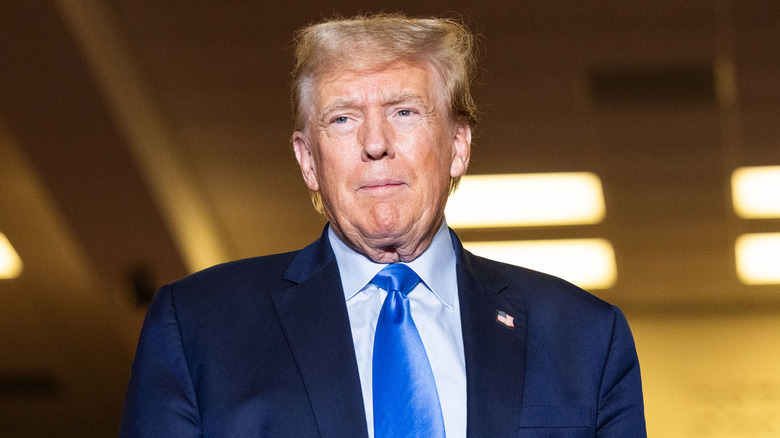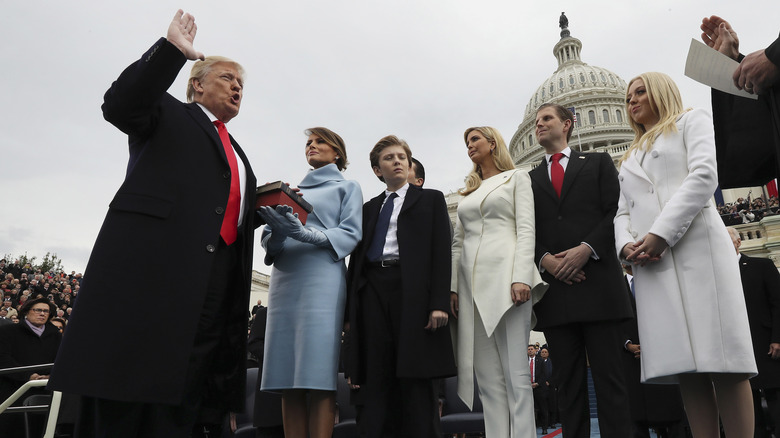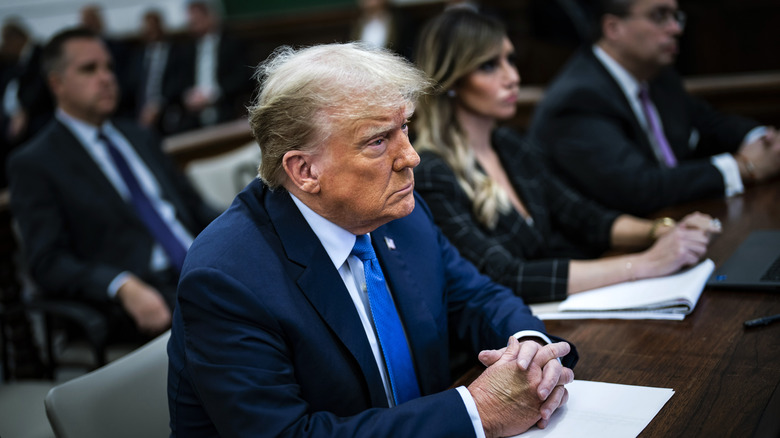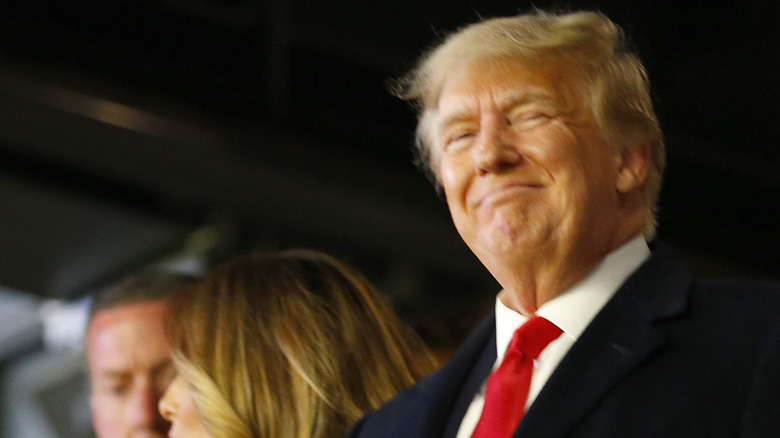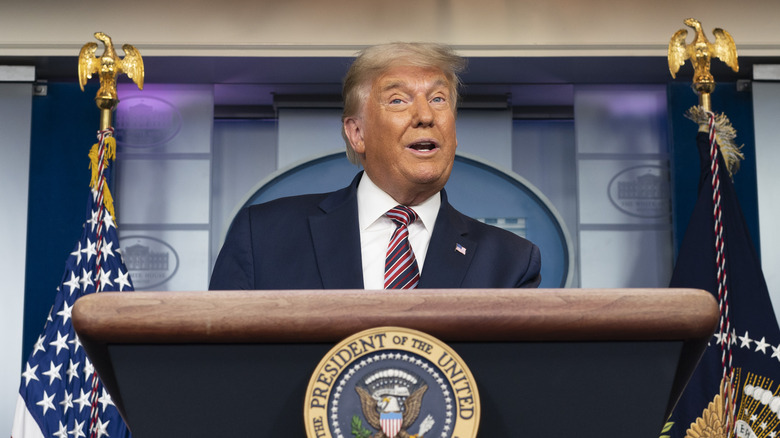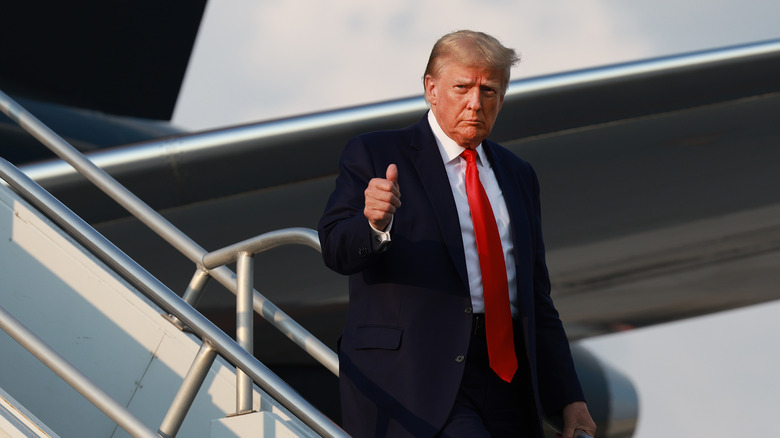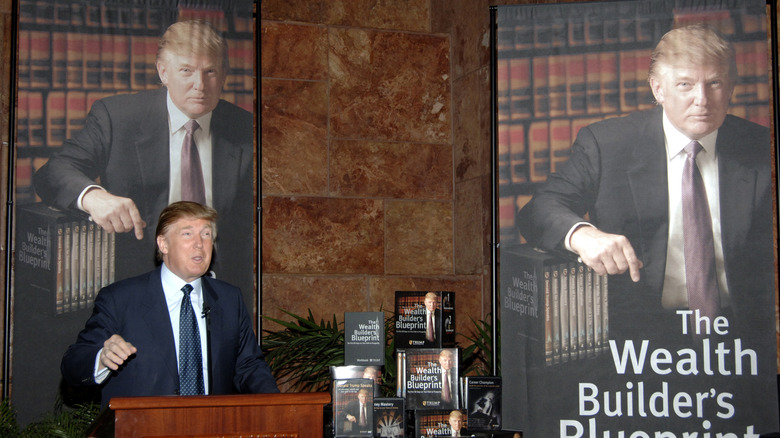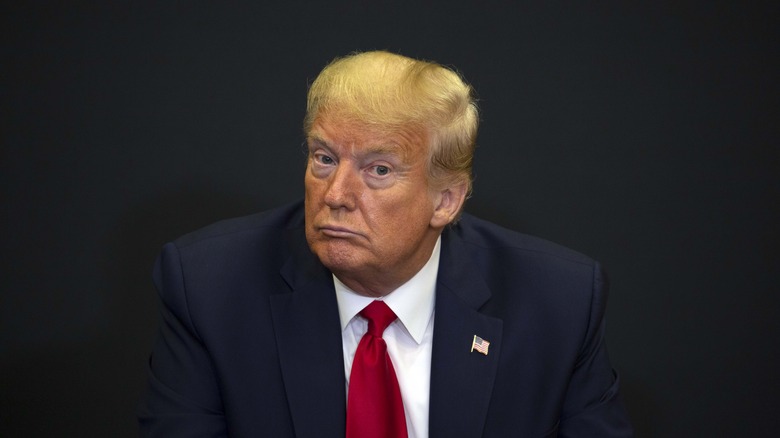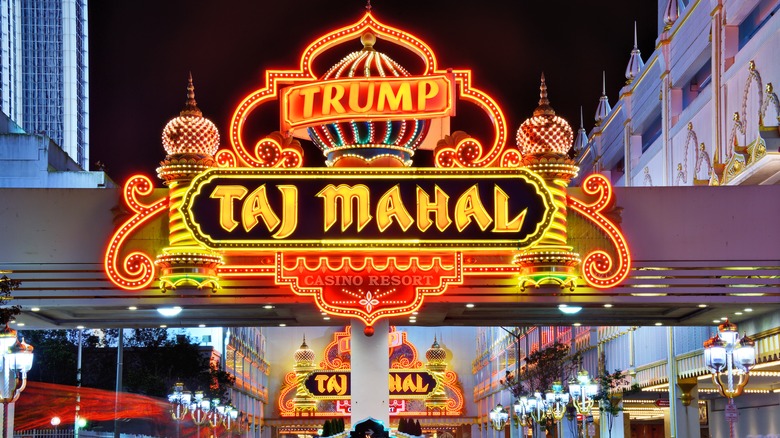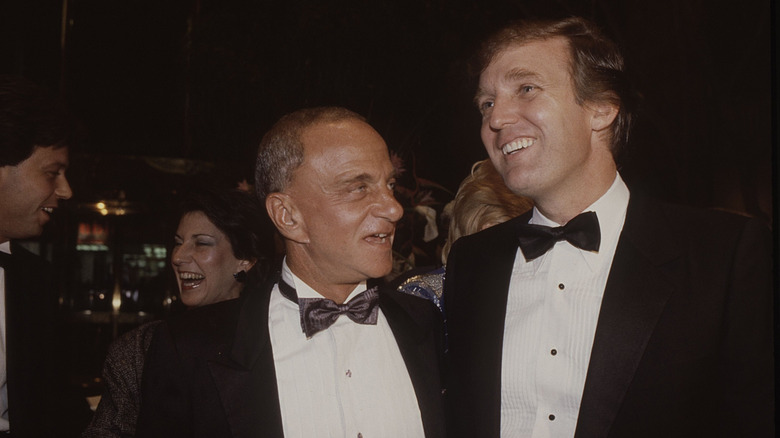9 Times Donald Trump Was Accused Of Lying Under Oath
Amid former President Donald J. Trump's fraud trial in New York State, headlines are honing in on his penchant for lying under oath. While this trial is the latest in a string of his calculated mistruths on the stand, it's far from his first brush with insincerity. In his many dealings with lawsuits over the years, Trump has become known as an unreliable party and a person of unreliable testimony. When not avoiding questions altogether, he diverts attention away from the problem at hand or confuses the courtroom by explaining himself in a way that either doesn't make sense or doesn't add up, like placing decision making responsibility on his children and then circling back.
That is no surprise to politicos or politically-minded folks since The Washington Post had a running count of the number of false statements he made during his presidency–it topped 30,000. While those statements weren't always made under oath, it does set a precedent that the former president tends to conflate truth and fiction. He has also faced thousands of lawsuits in his decades of businesses, often leaving him in a financial lurch.
During his libel case against journalist Timothy L. O'Brien, author of "TrumpNation," Trump admitted in his deposition that he had lied under oath 30 times in his life. Granted, that was back in 2011, so that number has undoubtedly risen since then. Let's revisit some of the many times Trump has taken the stand or done a deposition and lied under oath.
Trump admitted to lying under oath at least 30 times
Following the publication of the book "TrumpNation" by journalist Timothy L. O'Brien, Donald J. Trump slapped O'Brien with a libel suit. Trump alleged that O'Brien undercut the wealth of his company, but documents shown in court demonstrated that Trump's testimony under oath of his wealth was trumped-up lies. Trump ultimately lost the case in 2011, but during his deposition in 2007, he made a lot of false claims under oath.
During the deposition by O'Brien's legal team, Trump admitted that he had lied 30 times while under oath. He lied about everything from how much money he had to how much money he owed, even down to how much one of his golf memberships cost. It should be noted that the attorneys interviewing Trump in the deposition had copies of his financial statements and business records, which they could have used if he hadn't admitted to lying. Without Trump's confirmation, we may never know how many times he's actually lied under oath.
Part of Trump's game in giving testimony is to talk in circles while his legal team figures out what he should do next. Per Politico, it seems that Trump isn't so much concerned with being smacked with a perjury prosecution so much, but instead that he tells a story with such exacting specifications that he can't go back on what he's already said. Hence why he talks at length so often after being asked a straightforward question.
Trump has a confrontational personality
Donald J. Trump is not a stranger to depositions and lawsuits. His personal and professional life has been full of them for decades. When he is confronted with legal action and cameras or reporters are present, it becomes more of a spectacle than a legal proceeding. Suddenly, his entire life or his perception of it shows up on the stand instead. His strategy, or lack thereof, usually entails talking about anything other than what he's been asked.
For example, during a June 2016 deposition for a lawsuit against a chef who pulled his restaurant out of a Trump building, he expounded on his perception of his voting record as a then-presidential candidate. "...you know, when you get more votes than anybody in the history of the (Republican) party, history of the party by far, more than Ronald Reagan, more than Richard Nixon, more than Dwight D. Eisenhower, who won the Second World War, you know, that's pretty mainstream, when you think about it."
Although a seemingly ridiculous sentiment, Trump's explanation had nothing to do with the lawsuit at hand and everything to do with pivoting the conversation. This is a tactic the public would come to recognize as his most common one during and after his presidency. Even on the campaign trail ahead of the 2016 election, Trump was telling anyone and everyone opinions that would win him favor, even if they were contradictory.
Fined for breaking gag order
In October 2023, Judge Arthur Engoron fined former President Donald J. Trump $10,000 after he testified in his own defense about breaking a gag order. When giving his verdict, Engoron said, in part, "As a trier of fact, I find that the witness is not credible." Engoron found the testimony not credible after Trump was expressly told not to discuss Engoron's staff with the media and did so anyway. All parties involved in the NY civil case were given the same gag order, not just Trump.
On October 25, 2023, Trump made comments outside of the courthouse that broke the gag order for the second time in less than a week. He commented to the press about "a person who's very partisan sitting alongside" Judge Engoron. Trump and his legal team both told the court that the comments were about Michael Cohen, one of Trump's former lawyers who had been testifying.
The gag order was set after Trump posted on Truth Social on October 3, 2023, maligning the judge's principal law clerk, Allison Greenfield. Trump's social media attack was against Greenfield for previously taking a photo with Senator Chuck Schumer and then alleged that the two were having an affair. Trump also said that the photograph was enough to dismiss his case in Engoron's courtroom.
Lied during deposition in E. Jean Carroll case
During a defamation case between former President Donald J. Trump and former Elle columnist E. Jean Carroll, Trump was caught in several lies in his deposition. The case was brought against Trump by Carroll, who accused Trump of rape that occurred in the mid-1990s because Trump smeared Carroll's reputation after the accusation came to light. She sued him for defamation of character, noting that his pushback against her accusation and weaponization of her character had damaged her livelihood.
Not only did Trump lie repeatedly under oath over the course of the case, but one particularly egregious set of lies is the most obvious since he himself has admitted to it. Trump denied during his deposition ever touching a woman without her consent. "He said no under oath. The whole world knows that on an Access Hollywood tape, he boasted about how he would grab them by the 'blank,' and you could do it when you're a star," Katie Phang, legal analyst and MSNBC host, said (via Newsweek). "He's caught in repeated lies throughout the course of this sworn videotaped deposition."
In September 2023, Trump was found liable in the Carroll case. The former president was ordered to pay $5 million in damages to Carroll, which his legal team immediately indicated they would file an appeal.
Broke the oath during the Georgia voter fraud case
After losing the 2020 Presidential election, former President Donald J. Trump continued to weave threads of mistrust against the voting system. US District Judge David Carter determined in October 2022 that Trump lied under oath about his involvement in trying to overturn the election results in the state of Georgia. Carter determined after Trump insisted he had nothing to do with the dust-up over potential voter fraud in Georgia despite evidence to the contrary.
With emails between Trump and his allies in evidence, Carter could assess that Trump's denial of involvement was a lie. He said, "The emails show that President Trump knew that the specific numbers of voter fraud were wrong but continued to tout those numbers, both in court and to the public." After Trump's August 2023 criminal indictment in Georgia for his alleged involvement in attempting to overturn Joe Biden's victory in the state, it was determined that the former president lied at least 27 times in matters related to the case. Some of those lies include saying he won Georgia in 2020, that he won the swing states in 2020, and that ballots were being dumped in Georgia. The indictment outlined 21 outright lies regarding voter suppression.
Said he didn't know Trump University professors
Trump University, which was never an accredited institution, closed in 2010. In 2016, when a large fraud suit came forward against the university and Donald J. Trump, Trump swore he knew the identities of a group of professors in the university. Trump claimed that he had "handpicked" the professors who'd be teaching at the school — in reality, Trump had not actually done so, and had only ever even met one of the professors. Trump University was on trial for defrauding students with their real estate courses.
Even on a less significant note, Trump even lied during the Trump University case about his feelings on the Clintons. In 2008, Trump wrote that Hillary Clinton was "smart, tough, and a very nice person, and so is her husband." He also wrote that "Bill Clinton was a great president." When asked about that blog entry directly during the deposition, Trump wouldn't answer the question and instead started rattling off comments about the Monica Lewinsky affair.
He even said on the stand during this case that he never thought about politics much before 2008 (when he wrote the blog post) despite saying he thought about running as a presidential candidate with the Reform Party, which he noted he would have won, in 1999.
Wouldn't clarify his relationship with a failed Florida condo project
After a condo project in Florida failed, Donald J. Trump would not confirm his relationship with the project and lied about his involvement under oath. He was listed in the building's marketing materials, and it had his name on it, yet he denied involvement in the project outside of signing the rights to use his name. The building, which closed after taking hundreds of thousands of dollars in nonrefundable housing deposits, allegedly had nothing to do with Trump.
In his testimony under oath, Trump told the court that, even though the building was marketed as a "signature development by Donald J. Trump, " he did not develop it. He then explained that sometimes his company develops buildings with his name attached, and sometimes they don't. When asked why the marketing materials didn't elaborate on that wishy-washy statement, Trump said, "You can't put it in the advertising because there's not enough room."
During that testimony, he also went back and forth about who made decisions within the Trump organization. He told lawyers at one point that he is the ultimate decision maker, then said sometimes other people make decisions with or without his approval, but then said that there aren't any cases in which he doesn't have approval.
Jacked up his business's financial health to commissioners
Before declaring bankruptcy for his Taj Mahal casino in 1991, Donald J. Trump lied to commissioners about the business's financial health. When put on the stand to attest to the solvency or insolvency of his casino's finances, Trump lied about how much money it was actually making. Since Trump has been sued over 3500 times in his life, often over money, it makes sense that his businesses weren't always financially well. After all, the Taj Mahal casino alone owed money to over 250 subcontractors.
During a licensing hearing in 1988, Trump told the Casino Control Commission that all sorts of banks wanted to loan him money. "I'm talking about banking institutions, not these junk bonds, which are ridiculous," Trump testified. "The funny thing with junk bonds is that junk bonds [are] what really made the companies junk." Turns out, the junk bonds were precisely what he got since banks weren't lining up to hand him hundreds of millions of dollars. Just over a year after it opened, the Taj Mahal was bankrupt.
Trump even told The Washington Post that the Taj Mahal declaring bankruptcy was not a personal failure but rather that it was a big success that made him a lot of money. Instead, he declared the bankruptcy due to a poor economy in 1990.
Lied about connections to crime lords in NYC
Donald J. Trump was accused of providing housing to mafia-connected crime lords in New York City. He swore to the state that he was not associated with the mob in any capacity, though he has had clear ties for decades. As mentioned above, Trump admitted to lying under oath during his libel suit against journalist Timothy L. O'Brien. One of those times was when he was asked directly if he was associated with anyone from organized crime, and he said, "not that I know of." Except he knew people in the mob and even admitted that to O'Brien when he interviewed Trump for the book; Trump leased property to Daniel Sullivan and Kenneth Shapiro in the 1980s, both of whom have ties to the mob.
In part of that interview, Trump told O'Brien about handling organized crime lords. "I just was able to handle them," Trump said. "I found [Daniel] Sullivan to be the tougher of the two [between Sullivan and Kenneth Shapiro]. I started hearing reports about Sullivan, that he killed Jimmy Hoffa ... " Besides those two, Trump also worked with mafia-run firms to build Trump Tower and his Trump Plaza apartment. He even associated with Anthony "Fat Tony" Salerno and Paul Castellano, whom he bought concrete from.
More than that, Trump was friends with the notorious Roy Cohn, who was head counsel for the even more infamous Senator Joseph McCarthy. Cohn also famously represented both Salerno and Castellano. Trump didn't just have ties to the mob; he had the most significant ties.

